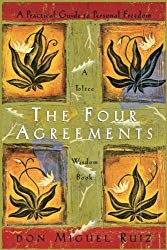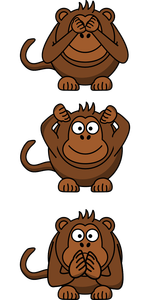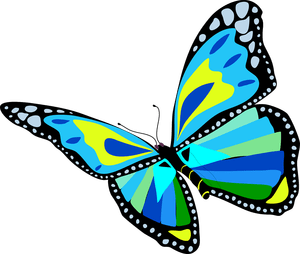Do you ever learn a new word then start to see it everywhere? How is this possible when you’ve never noticed it before? I don’t know, but it happens to me all the time.
The Four Agreements is kinda like that. It’s been around for almost 20 years, but once I heard about it on a podcast a few weeks ago, it started popping up on Facebook, in news articles, everywhere!

![]() So here’s the scoop: The Four Agreements: A Practical guide to Personal Freedom by Don Miguel Ruiz is an almost pocket-sized, 138 page book (plus a brief introduction) that you can easily read in half a day. It looks like it should be in the teen section of the library, but the ideas are definitely for grown-ups too.
So here’s the scoop: The Four Agreements: A Practical guide to Personal Freedom by Don Miguel Ruiz is an almost pocket-sized, 138 page book (plus a brief introduction) that you can easily read in half a day. It looks like it should be in the teen section of the library, but the ideas are definitely for grown-ups too.
Like Big Magic, it leans toward the mystical which made me hesitate, but this book has been a New York Times bestseller for many years and has been translated into over 40 languages, so I persevered to see what the fuss was all about. Plus, we aren’t talking War and Peace here, we’re talking a two-hour easy read.
It turns out that, like with Greek mythology and biblical parables, the lessons are valuable even when separated from the overarching larger story. They’re simple and obvious in hindsight, which is what makes them so great. They make sense. They provide a whole new framework for thinking about everything- like a how-to guide for life.
Domestication and the Dream of the Planet
The author, son of a healer and a shaman, was born in rural Mexico and The Four Agreements is based on the teachings of the ancient Toltec culture.
The basic premise is that everything we know as real is actually a dream. Our perception is the blurring of our own dreams combined with the collective dreams of other humans. As children, we don’t know any better than to buy into these dreams because kids believe what adults tell them. They either don’t realize that these beliefs should be questioned or aren’t strong enough to win the argument if they do question them. After hearing and being surrounded by these dreams as we grow, we begin to believe them and agree with the information they represent.
Ruiz calls this the domestication of humans.
Children are domesticated the same way that we domesticate a dog, a cat, or any other animal… with a system of punishment and reward… Soon we became afraid of being punished and also afraid of not receiving the reward. The reward is the attention that we got from our parents or from other people like siblings, teachers, and friends… With that fear of being punished and that fear of not getting the reward, we start pretending to be what we are not, just to please others, just to be good enough for someone else… We pretend to be what we are not because we are afraid of being rejected… of not being good enough. Eventually we become someone that we are not. We become a copy of Mamma’s beliefs, Daddy’s beliefs, society’s beliefs, and religion’s beliefs.
He states that eventually we become so well-trained and these beliefs become so ingrained that we finish the domestication process ourselves. Like a dog who is used to being shocked by an electric fence stays in the yard even when the fence is turned off, we are conditioned to conform to society’s expectations.
As we grow, we are exposed to new ideas but still try to make them conform to these ingrained beliefs, and the struggle is real and painful. “Even if we understand the concept of [our beliefs] not being true, we feel the blame, the guilt, and the shame that occur if we go against these rules.”
We try so hard to be perfect that we can’t be ourselves. We’re paralyzed by fear of rejection. We want to be accepted by everyone, especially our families, our educators, and our religious leaders, but we can’t please them all. We try so hard to become what we think everyone else wants us to be that we forget to live for ourselves.
We imagine that if only we were perfect, that we would be loved. We don’t realize that not only can we not please everyone, we also can’t be perfect.
But we still reject ourselves and others for not being perfect. We suffer guilt, shame, and fear. We try harder. We hide, we pretend, and we still fail.
Even more heartbreaking, we pay countless times for each mistake we make. We don’t just acknowledge them, learn, and move on. There is no forgiveness. We relive each error and suffer anew each time we remember or are reminded of it. And we and society have excellent memories for such things.
Are you depressed yet? Don’t give up! There’s hope.
The rest of the book teaches us how to break our agreements with society’s beliefs that aren’t helpful and create positive substitutes.
The First Agreement: Be Impeccable with Your Word
Our word is how we communicate and how the world knows us. It’s our choice whether we use it for good or evil, to build up or to destroy. Please choose well.
Ruiz reminds us that we know by now not to believe everything we hear, but some days we can’t help it. Others, especially children, may also take what we say at face value and make it their truth, so we need to speak with integrity.
I have distinct memories of being told that I was too smart for my own good as well as not pretty and worthless. I heard often and believed that I couldn’t do anything right.
I know it could have been much, much, worse. And 20+ years later, I also know that these comments are more a mirror of the speaker than a reflection of 10-year-old me. But at the time, they were crushing.
Luckily, I had other adults around who built me up, not just ones who tore me down. My grandfather thought I could do no wrong, which also wasn’t true, but it did offer some balance.
 One careless statement uttered in anger or frustration can have profound effects on a child’s life. Being told that she’s ugly or stupid, or that she has a terrible voice, can change the life trajectory of a young girl. We need to be gentle.
One careless statement uttered in anger or frustration can have profound effects on a child’s life. Being told that she’s ugly or stupid, or that she has a terrible voice, can change the life trajectory of a young girl. We need to be gentle.
This agreement is simple: tell the truth. Opinion, without verification in fact, is not truth, so don’t gossip. Spreading misinformation can color the perception, and thus the reality, of others. It’s emotional poison that spreads like a virus. Don’t contribute to the plague of fear, hatred, and pain.
We also need to tell ourselves only the truth. False and negative self-talk can be even more harmful than gossip about others. We must be kind and gentle with ourselves too.
Furthermore, we don’t have to accept someone else’s opinion about us as our own truth. If we love ourselves, we build immunity against the toxins of others by being impeccable with our word and learning to tell the difference between fact and other people’s judgments. Negative ideas will only stick if our minds are fertile ground for them.
The Second Agreement: Don’t Take Anything Personally
Have you ever been told, “It’s not you, it’s me”? Did you believe it? You should.
It’s human nature to think that everything is about us, that everyone is watching and judging our every move, but it just isn’t true. We’re all too busy focusing on ourselves to care that much about anyone else.
Yes, every now and then the media will focus on someone in particular, but that’s why they call it 15 minutes of fame, not 15 hours, days, or years. And they really only care to the extent that they can benefit from telling the story.
Do you remember the sing-song chant from our playground days: I’m rubber, you’re glue. What you say bounces off me and sticks to you!
I didn’t truly buy into this at the time, but I do now. I just wish my rubber were a bit less permeable.
When people spew hatred, it typically means they’re hurting. They’re sad, afraid, or wounded. If they were happy, whatever it was that upset them wouldn’t be such a big deal.
 Think about the last time someone cut you off on the freeway. Did you blast your horn and tailgate him? Did you speed around him and then cut him off? Or did you give him some space because he’s a terrible, drunk, or distracted driver and you want to make sure that you’re not involved in an accident? How much of your response depended on your mood more than his behavior?
Think about the last time someone cut you off on the freeway. Did you blast your horn and tailgate him? Did you speed around him and then cut him off? Or did you give him some space because he’s a terrible, drunk, or distracted driver and you want to make sure that you’re not involved in an accident? How much of your response depended on your mood more than his behavior?
Would it change your reaction if you knew he was racing to the hospital with a sick child? What if he was distracted because had just lost his job and was wondering how he could pay the rent? There’s always more going on than you will ever know.
Do you remember the last time that a good friend ghosted? There was no explanation, just no response to calls and texts. Maybe she doesn’t like you anymore and doesn’t want to hurt your feelings by saying so. Maybe she’s just busy. Fine, you don’t need friends like her anyway!
Or maybe she’s hiding. She’s sad or ashamed and would prefer to be invisible while she struggles with a divorce, a miscarriage, or depression. She doesn’t realize that you feel sad and rejected because she’s too wrapped up in her own misery. Of course you’d be honored to walk with her through her struggles, but this isn’t about you. All you can do is be there with open arms when she’s ready.
What about the most recent compliment you received? Was it about you or about what the giver wanted from you? You can bet your bottom dollar that when my patients tell me I’m beautiful they follow it up with a request for narcotics.
We choose what we believe. If someone tells me that I’m green or purple, I know that isn’t true. If someone tells me I’m shorter than average, I believe it because I know it’s true. But if someone tells me I’m nice/mean/stupid/smart I (try to) withhold judgment on myself until I have verification rather than just accept it as fact because they said so.
On the bright side, there’s no harm in spreading peace, love, and joy to the world, especially if we are rubber and glue. As my elementary school principal told us every afternoon on the announcements, “Keep on smiling, because when you smile, the whole world smiles with you.”
The Third Agreement: Don’t Make Assumptions
![]() The biggest problem with making assumptions is that we believe they’re true. We want answers, so we make them up. Then, our minds interpret them as facts rather than hypotheses.
The biggest problem with making assumptions is that we believe they’re true. We want answers, so we make them up. Then, our minds interpret them as facts rather than hypotheses.
We only see what we want to see, and hear what we want to hear.
Clarifying feelings, interpretations, and expectations can save us from fights, misunderstandings, and heartache.
We assume that everyone is like us and thinks the way we think. We assume that people can read our minds and know what we want without us having to ask for it. We make assumptions about others and about ourselves.
With the bad driver and the vanishing friend, assuming we know their motivations can lead us to actions that make things worse. We could cause a fatal accident or become so upset with our friend that we’re not there when she does finally ask for help.
And don’t forget the second agreement: don’t assume it’s all about you. That driver didn’t cut you off because he didn’t like you. You just happened to be in the wrong place at the wrong time.
We also assume that everyone sees the world the way we do. Have you ever overheard coworkers in the break room having a discussion about Bernie Sanders or Donald Trump? They may not share your views, but they sure assume that everyone else shares theirs! This is a recipe for disaster.
The Fourth Agreement: Always Do Your Best
Finally, Ruiz reminds us that while perfection is impossible, we should always do our best. But keep in mind that our best is better when we’re healthy, sober, and well-rested. It will also change with our moods, and it will change over time and with practice.
Furthermore, we should focus our best efforts on things we enjoy. We should appreciate the process and the action, not just anticipate a future reward. Remember, life is a journey, not a destination.
If your job, your piano lessons, or your relationships truly make you miserable, if they suck your soul out every time you think about them, then let them go and find something else. If you hate something that much or it’s that toxic, you can’t give it your best. Quitting isn’t always a failure. It gives you back your time and energy to do something else that you can do better.
This agreement encourages us to not only enjoy the moment and create a brighter future, but also to avoid dwelling on nightmares from past. Mistakes are teachers and we can improve with practice.
Not enjoying what is happening right now is living in the past and being only half alive. This leads to self-pity, suffering, and tears.
It reminds us not to judge ourselves or beat ourselves up if we break one of the agreements. Just start again. We’ll get better over time.
The Toltec Path to Freedom: Breaking Old Agreements
We’ve learned four new agreements, but we’re not done yet. We still have to break free from the old agreements of society’s beliefs and prejudices.
 Ruiz reminds us that little kids are free. They’re usually smiling and exploring, and they live in the present.
Ruiz reminds us that little kids are free. They’re usually smiling and exploring, and they live in the present.
As children we are not afraid of the future or ashamed of the past. Our normal human tendency is to enjoy life, to play, to explore, to be happy, and to love.
Most adults aren’t aware that they’re not free, but once we become aware we can work to gain our freedom. We can question the beliefs of our childhood and choose which ones we agree with, then distance ourselves from the others.
Society’s beliefs and habits act as parasites, giving us negative energy and stealing our positive energy. Stop the cycle. With baby steps, we can challenge our beliefs one at a time. It will take time, effort, courage, and practice, but the end result is worth it.
We don’t know how much time we have left to live. We could live for decades, get hit by a bus today, or be diagnosed with cancer tomorrow. So don’t wait- break free today.
The New Dream: Heaven on Earth
If we follow this plan, we can create our own perception of reality and choose to live well.
Imagine living your life without the fear of being judged by others. You no longer rule your behavior according to what others may think about you. You are no longer responsible for anyone’s opinion. You have no need to control anyone, and no one controls you, either.
Imagine living your life without judging others. You can easily forgive others and let go of any judgments that you have. You don’t have the need to be right, and you don’t need to make anyone else wrong. You respect yourself and everyone else, and they respect you in return.
Can’t you just breathe a little easier? Do you feel more peaceful and hopeful? Ruiz tells us that happiness is a choice, and suffering is a choice.
What will you choose?
Do you agree with Don Miguel Ruiz and The Four Agreements? What choices have made the biggest difference in your life?
This post contains affiliate links. Learn more here.

Comments 5
Four Agreements that will allow you to live a better life.
This is so strange! Last night I put a hold on this book from the library!
Author
How neat! The world works in mysterious ways 🙂
Although I’ve never heard of this book (or theology) before, the ideas are very similar to the process I’ve been going through in my own life for the past several years. I particularly like the second point. At first, realizing that the world doesn’t revolve around me kind’a sucked! Then, slowly, I began to realize the freedom such knowledge brings with it. You have a good blog here! I intend to keep reading
Author
Thanks so much for your kind words. This was a real eye-opener for me as well. It is liberating to realize that most people don’t pay much attention to anyone but themselves and that even wise-looking and sounding adults often have no idea what they’re talking about.